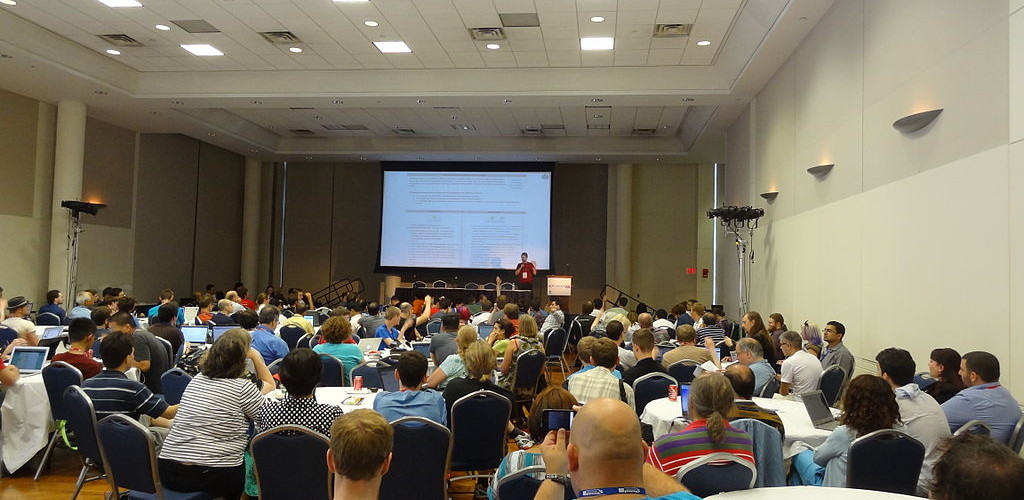Getting ready for a presentation can take a lot of work. There are many questions you have to ask yourself and then answer yourself. Today I’m going to attempt to address some of those questions and hopefully provide some helpful answers.
What do I present on?
This question is the biggest and also the hardest to answer. To help narrow the number of possible topics let’s ask ourselves a few questions.
- Is there anything I have mastered that others often ask me questions about?
- Have I been learning anything new lately?
- Is there anything I would like to learn, something that I think others might also be interested in?
If you can answer yes to any of these questions, write down the topic and continue thinking of more topics. After you have a few possibilities, and you only need a few, start outlining the subjects you would need to cover to effectively demonstrate each topic. After you have 5 to 10 topics with subjects outlined, think about how long it might take you to talk about those subjects. Include code demonstration time if necessary to explain the subject. Your talk needs to last about an hour, so any topic with too many subjects or too few subjects can be pruned at this stage. Any topics left should be good to present on. Choose the one that most excites you or that you think others would benefit most from.
Should I write code?
We are all programmers. We all write code everyday. Writing code should be easier than making slides, right? Wrong! I have found that most developers, when given a screen that many people can see, forget how to type. It happened to everyone I have helped to present. You will forget how to type and even what it was that you were trying to type. Now, don’t get me wrong. I think the presentations that include live code are the best. You need to be aware of the issues though. Forgetting how to type is actually the least of the possible problems. Code never does what you expect it to do when you’re on a stage. You will encounter a bug you didn’t expect and have to fix it right there in front of everyone.
I’m not saying you should avoid live coding. I am saying that if you want to show some real code there are a few ways to alleviate the discomfort of presenting at the same time. Firstly, reduce the size of your audience. It won’t help you to type any better, but a small audience is much more likely to forgive you and fewer people means less stress. Another thing you can do is prepare code snippets. Having copy paste code available gives you a fallback in the event that the code you write doesn’t work correctly. Sometimes just knowing you have a backup plan can make all the difference. Lastly, if you are really unsure but still want to show real code, you can record the typing of the code and have a live code sample that has been tested and proven to work ready to demonstrate. This way, you simply show the video of the code being written while talking about the subject of the code. After the video you can open the real code and show that it works and does whatever it is supposed to do.
Can I use the internet
No, It won’t work. You simply can’t count on the venue you are presenting at to have good internet access. Instead download any materials and copy or screenshot any websites you need for your presentation ahead of time.
What presentation software do I use?
Early on, I would suggest using something simple that you probably already know. For example, PowerPoint or Impress (Part of OpenOffice). These programs are designed for anyone to be able to make some slides that cover a topic. Both have templates that you can download and use that will give your presentation a tiny bit of pizzazz.
Once you’re comfortable making presentations with those, or you just feel fancy, you can move on to some of the new presentation mechanisms such as Reveal or Impress.js. These frameworks have the ability to make fancy slides that can be delivered with no real software. You can deploy them to your personal website and load them into a browser for presentation. They can do most of the things something like PowerPoint can do and somethings PowerPoint can’t do.
How do I organize my slides?
This is such a large topic that I’m afraid I won’t be able to cover it in a blog post. There are so many different ways that play to so many different strengths. Just to get started I’m going to make a suggestion of the 5 Paragraph Essay modified for presentation form. My version goes like this.
- Introduce yourself and your topic – give three things you are going to cover
- Cover the first thing
- Cover the second thing
- Cover the third thing
- Summary of what was covered
Each slide can be broken down similarly. This gives a formula to everything. Subconsciously your audience will recognize the formula and will be familiar with it. People tend to like things that feel familiar. The bonus is that each content slide needs to take about 15 minutes so if you can’t cover, on average, that amount of time then you know you need to expand on the idea covered in a particular slide. The first and last slides would only need 5 to 7 minutes each to end your presentation at roughly an hour.
Presentation Over
I truly hope that you can create a great presentation and that the information I have provided in this post will help you to accomplish that goal. There is a lot more to cover on this topic but it will have to wait for another time.
Clayton has been programming professionally since 2005 doing mostly web development with an emphasis on JavaScript and C#. He has a focus Software Craftsmanship and is a signatory of both the Agile Manifesto and the Software Craftsmanship manifesto. He believes that through short iterations and the careful gathering of requirements that we can deliver the highest quality and the most value in the shortest time. He enjoys learning and encouraging other to continuously improve themselves.








